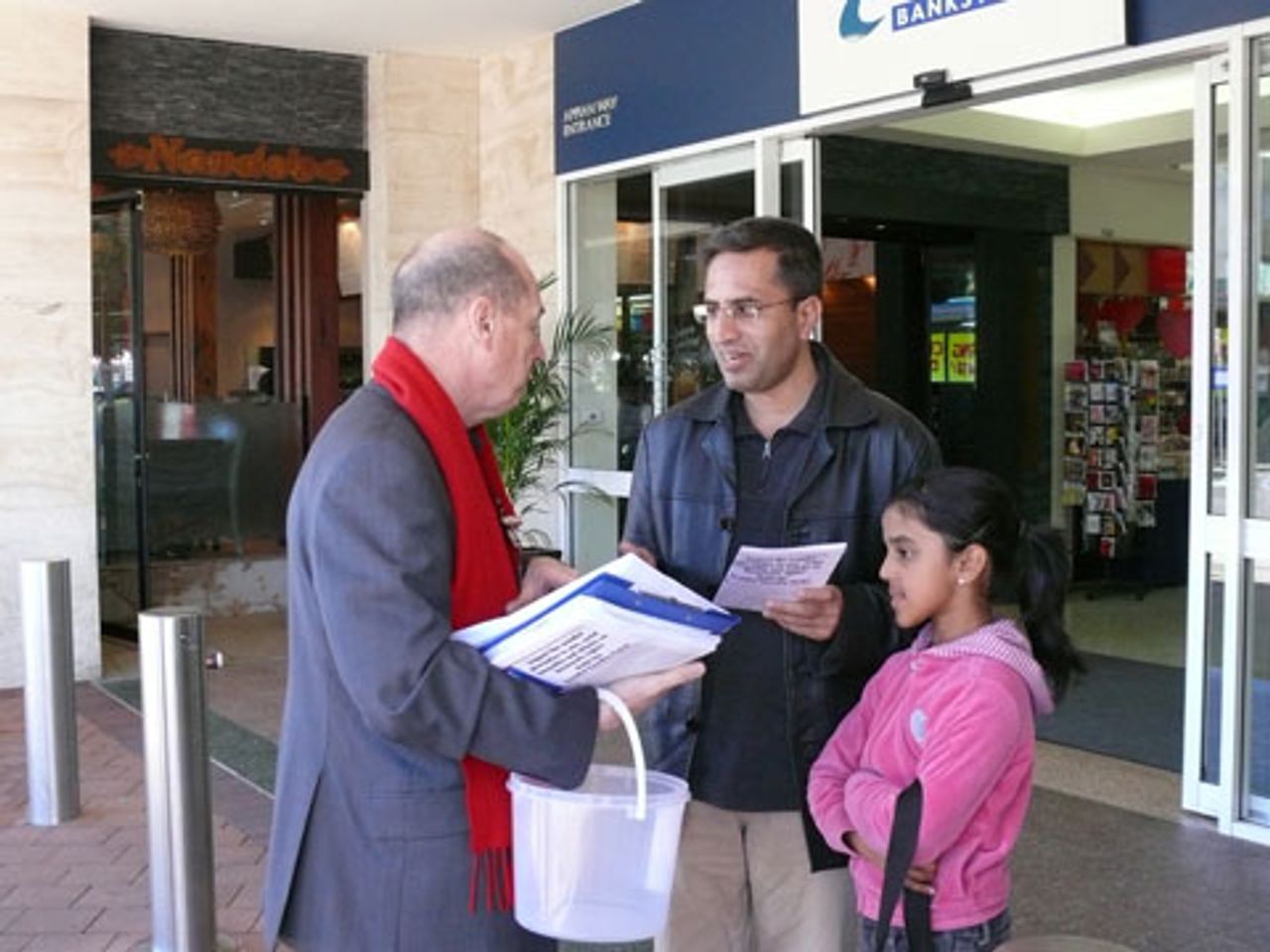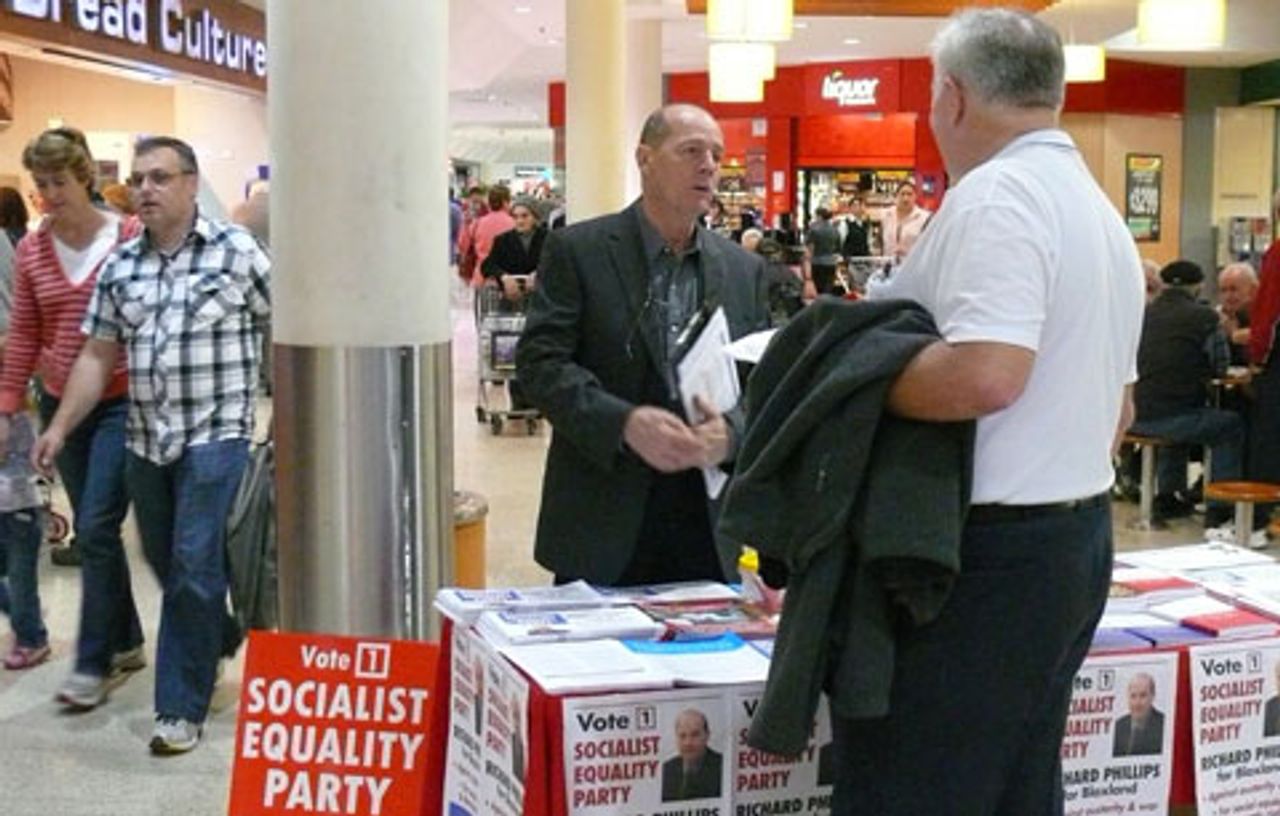Socialist Equality Party members and supporters have won important support from workers and youth in the federal electorate of Blaxland for the party’s policies over the past three weeks.
The southwest Sydney seat, which includes Bankstown, Yagoona, Bass Hill, Chester Hill, Regents Park, Villawood and other suburbs, is one of the most culturally diverse and poorest in Sydney. Almost 50 percent of Blaxland residents are immigrants, with the largest numbers from Lebanon, Vietnam and China.
Once a major industrial centre, with employment available in the Chullora railway workshops, the aircraft industry and numerous metal shops, the electorate has been devastated by closures and job downsizing over the past three decades, at the hand of consecutive Labor and Liberal governments, state and federal alike.
Weekly household income in Bankstown is among the lowest in Australia. Recent figures indicate that over 30 percent of families in the area attempt to survive on less than $650 per week. Mortgage stress is widespread. During 2007-8, more than 300 Blaxland families, or almost one per day, defaulted on their housing loans.
Jan Tafou, who recently immigrated to Australia from Sierra Leone, spoke with SEP campaigners in Bankstown about Rudd’s removal. “This was a putsch by the mining companies,” she said. “I’m from Africa where lots of governments have been overthrown, but this is usually done by the military; here it was the deputy leader and from within. Gillard and her people are now puppets of the mining companies. If they had not agreed with the removal of Rudd it would not have happened.”
Fatou went on to say that she opposed Australian involvement in the US-led wars in Iraq and Afghanistan. “I just want the strong countries to keep out of the poor countries—to leave these people alone. Colonialism has been going on for hundreds of years and it always causes poverty and wars. These big countries have to stop telling people what to do. They should leave them alone and then there will be peace,” she said.
 Fayaz Sahibzada discusses SEP policies with Richard Phillips
Fayaz Sahibzada discusses SEP policies with Richard PhillipsFayaz Sahibzada, who is married with two children, told the SEP his principal concern was unemployment. Sahibzada is a highly qualified and experienced dietician who immigrated to Australia from Pakistan in 2004. Unable to find work in his profession, despite completing a masters degree at the University of Wollongong in 2007, he now does part-time security work.
“I think the main issue in this election is unemployment but it’s not being discussed. Instead all the parties just talk about refugees and asylum seekers. I thought Australia would be a good country and give me a good quality of life for my family, and education for my kids.
“When I arrived here, John Howard was in power and then Rudd was elected. This didn’t bring about any real change in policies and now everything seems to be getting worse. Everyone is frustrated and angry over the unemployment situation but the media uses this to stir up racism against immigrants. This is not a healthy situation,” Sahibzada said.
Bass Hill
 SEP candidate campaigning at Bass Hill Plaza
SEP candidate campaigning at Bass Hill PlazaOn August 1, SEP campaigners secured permission from the Bass Hill Plaza management to establish a bookstall inside the building. Australian mall owners consistently violate the democratic rights of election candidates other than those of the major parties, stopping party campaigners from establishing election tables in their shopping facilities. But on this occasion, the SEP bookstall became the focus of attention for shoppers, with animated discussion on many issues during the three-hour campaign. While Blaxland is regarded as a safe Labor Party seat—it has been held by only four MPs since its creation in 1949—the degree of animosity in the electorate towards the Labor government is now palpable.
Patricia Kahn, originally from Colombia, has supported the Labor Party since she emigrated to Australia in the early 1970s. Like many who approached the SEP’s campaigners, Kahn said she would not vote Labor at this year’s federal election. Asked why, she said: “I don’t agree with the way Kevin Rudd was removed.
“Everybody knows that he was kicked out to benefit the mining companies. It’s not exactly the same as Chile but the mining companies and the CIA got rid of Allende there. Gillard and her friends are just copy-cats.”
Kahn said she was also disgusted with the government’s treatment of asylum-seekers: “I don’t think there are any differences between the two big parties—Labor and the Liberals. Just look at what they do to refugees and asylum seekers. People should be allowed to come and go out of any country they want. What’s the problem with that? Someone we knew was locked up in immigration detention for nearly two months until he was deported back to Pakistan. I was very sad.”
Not far from the Bass Hill Plaza is the Villawood Immigration Detention Centre—a high-security, barbed-wire enclosed facility that currently incarcerates over 500 asylum seekers. The Labor Party claimed in 2007 that if elected it would establish a “humane” policy for asylum seekers, an illusion bolstered by various middle class pseudo-left organisations and the trade unions, which promoted Labor as a “lesser evil”.
However, as the SEP warned throughout the 2007 election campaign, there was a seamless transition from Howard to Rudd and the violation of basic democratic rights has continued unabated. There are now more than 4,000 refugees incarcerated in mainland and offshore detention facilities, in violation of human rights conventions and international refugee laws—more than during the Howard government. Some 500 of these are children under 18 years of age.
Suicide attempts and self-harm incidents are a daily occurrence in these facilities, with many inmates developing severe depression, sleep disorders and other mental problems. In April this year, Labor reopened the remote Curtin Detention Centre in far northwestern Australia and is now detaining around 300 asylum seekers there. The centre was closed in 2002 when 100 inmates were involved in riots, hunger strikes and other protests.
Labor’s treatment of refugees, and the historical origins of its reactionary policies, was reviewed by the SEP candidate for Blaxland Richard Phillips at the party’s election meeting in Chester Hill on August 5. Phillips explained to the local audience that the establishment parties—Labor, Liberal-National and the Greens—were involved in an anti-immigrant bidding war.
“However they pitch it—‘stopping the boats’ or ‘creating a sustainable population’—the agenda is the same; to blame immigrants for the social crisis that Australian governments have inflicted on the working class.
“Many young people are rightly outraged over the political attacks on refugees and asylum seekers. Few, however, are aware that today’s anti-immigrant rhetoric and repressive laws follow the White Australia traditions, a founding principle of the Labor Party and inseparably connected to the ideology of Australian exceptionalism.
“Labor and the trade union bureaucracies argued from even before the Australian federated nation was founded in 1901, that the laws of the class struggle did not apply, and that there could be a common interest between workers and employers. It was possible in Australia, they claimed, to create a ‘working man’s paradise’ via various government measures, including the White Australia immigration ban on so-called “coloured” labour, tariff protection to protect local industry and the regulation of wages through federal arbitration and official state recognition of the unions.
Phillips said that while these claims were always false, they were sustained by Australia’s geographical isolation and the high profits made through the export of wool, wheat and other raw materials to Britain, which allowed a relatively high standard of living for significant sections of the working class.
The SEP candidate explained that although White Australia was dropped in the mid-1960s—as the shut-in character of the Australian economy began to break up with the growth of trade with Japan and other Asian countries and the development of more advanced forms of global travel and communications—the anti-democratic foundations of the country’s immigration policies remained.
“The race card is the default political position of Australia’s ruling class,” he declared, “and whenever it feels threatened by sharp political changes and an intensification of class antagonisms, the powers-that-be use this card to deflect attention from the real cause of the crisis in the capitalist profit system itself, and to divide Australian workers from their class allies at home and abroad.”
Phillips said that Labor had always played the leading role in this political process. He reviewed how the Keating Labor government introduced mandatory detention of asylum-seekers in 1992 and then removed legal limitations on how long refugees could be incarcerated.
“These inhumane and anti-democratic laws were taken further by the Howard government, after securing bipartisan backing from Labor, articulated by its then immigration spokeswoman, Julia Gillard. She is now preparing to revive off-shore processing in remote, under-funded and ill-equipped detention camps if Labor is re-elected on August 21,” Phillips warned.
Youth unemployment
The SEP candidate pointed to the growth of mass youth unemployment in the Blaxland area, which currently stands at 17 percent, with 45 percent of youth aged between 15 and 19 without jobs or not studying—almost double the national teenage unemployment rate of 25.8 per cent.
Phillips reviewed how the Carr state Labor government had maintained a steady stream of anti-immigrant invective against youth of Middle Eastern origin during its administration from 1995 to 2005. Immigrant youth were targeted in order to deflect attention from Carr’s “free market” policies and the scandalous lack of apprenticeships, decent education and recreational facilities for young people in working class areas. Labor’s torrent of abuse against Muslim youth was also used to justify a battery of anti-democratic laws imposed as part of the so-called “war on terror” and Australia’s involvement in the criminal US-led invasions of Iraq and Afghanistan.
Phillips outlined the SEP’s internationalist and socialist program, which advocates the unconditional right of all people, whatever their country of origin or ethnic background, to live and work in the country of their choice, with full citizenship rights, and insisted that all refugees in detention centres be released immediately. He concluded his address by explaining that the rise of nationalism and racism, not only in Australia, but around the world, were another indication that capitalism had reached a dead-end.
“The only way forward,” he said, “is in the struggle to build the SEP as the new mass party of the working class, and for a unified political movement of the international working class to refashion the world along socialist lines. The working class confronts global problems which require a global solution and this is the only party with the program to take up that challenge.”
Click here for full coverage of the SEP 2010 election campaign
Authorised by N. Beams, 307 Macquarie St, Liverpool, NSW 2170
